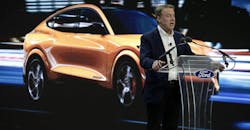Ford Motor Co. is downsizing the scale of a lithium-iron phosphate battery project it announced earlier this year for a site in Marshall, Mich., but it recommitted to the BlueOval Battery Park Michigan plant and indicated that it would begin producing lithium iron phosphate (LFP) batteries in 2026.
“We are pleased to confirm we are moving ahead with the Marshall project, consistent with the Ford+ plan for growth and value creation. However, we are right-sizing as we balance investment, growth, and profitability,” according to the automaker’s announcement. “The facility will now create more than 1,700 good-paying American jobs to produce a planned capacity of approximately 20 GWh (gigawatt hours/year.)”
Last month Ford reported it is reducing future investment in electric vehicle projects by $12 billion overall, compared with its previous announcements, and it has postponed construction of two other EV battery plants, one in Kentucky and another in Turkey.
General Motors has also slowed down its EV expansion in recent weeks.
When announced in February, BlueOval Battery Park was to employ 2,500 workers and produce 35 GWh/year of LFP batteries, with a planned budget of $3.5 billion. Ford did not report a new investment cost, but a 40% reduction in the budget, proportional to the smaller capacity, suggests a project costing around $2 billion.
Ford’s recommitment to the project also reaffirms its selection of the LFP battery as an option to nickel cobalt manganese (NCM) batteries, so that customers may choose an EV with “battery performance characteristics most aligned with their needs,” according to the automaker, earlier this year.
The automaker cited LFP batteries’ durability and tolerance for “more frequent and faster charging while using fewer high-demand, high-cost materials. This lower-cost battery, at scale, will help Ford contain or even further reduce EV prices for customers.”
Ford offers LFP power now on its Mustang Mach-E electric SUV, and next year on the F-150 Lightning, but those batteries are imported.
The LFP batteries to be produced at BlueOval Battery Park will be based on technology licensed by Ford from a Chinese business, Contemporary Amperex Technology Co. Ltd. (CATL.) That linkage has drawn criticism from federal officials. Some lawmakers have argued that the CATL involvement should disqualify Ford’s project from federal EV subsidies under the 2022 Inflation Reduction Act.
